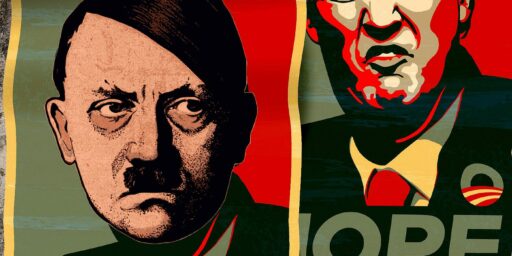Hitler Comparisons and Bad History
Contrary to popular belief, Adolf Hitler didn't come to power by democratic means or because of his ability to whip the public into a frenzy.
 Note: the following is an updated version of a post I originally wrote at PoliBlog on November 9, 2008. Indeed, the proximate cause of the original post was a comment to a post at OTB that was at least in the family of Obama-Hitler comparisons, so in many ways the circle is now complete.
Note: the following is an updated version of a post I originally wrote at PoliBlog on November 9, 2008. Indeed, the proximate cause of the original post was a comment to a post at OTB that was at least in the family of Obama-Hitler comparisons, so in many ways the circle is now complete.
As James Joyner noted earlier this week, Thomas Sowell penned a column for Investor’s Business Daily in which he asserts “In our times, American democracy is being dismantled, piece by piece, before our very eyes by the current administration in Washington, and few people seem to be concerned about it.” This dismantlement is likened to Hitler’s reign in Nazi Germany with a cameo appearance by V. I. Lenin, father of the Russian Revolution and supreme leader of the USSR.
Sowell writes:
during the worldwide Great Depression, the German Reichstag passed a law “for the relief of the German people.”
That law gave Hitler dictatorial powers that were used for things going far beyond the relief of the German people — indeed, powers that ultimately brought a rain of destruction down on the German people and on others.
This is compared to the establishment of the BP escrow fund which, on its face, strikes me as a problematic comparison, to put it mildly (and, in reality, is an absurd one). At a minimum we have here a corporation voluntarily entering into an agreement designed to help it manage its massive liabilities and deal with significant PR problems (and which its investors rather liked). While there is always room for criticism of such actions, likening it to the granting of dictatorial powers to Hitler as Weimer Germany slid into authoritarianism is a stretch of gargantuan proportions. In fairness to Sowell’s argument, such as it is, he indicates that it goes beyond just the issue of the escrow fund, although he does not enumerate his evidence.
Further (and this the main point of this post), Sowell makes a rather fundamental analytical error in his comparison. Specifically, he writes from the perspective that Weimar Germany (i.e., Germany in the interwar period as governed by the Weimar constitution) and the contemporary United States are somehow equivalent cases in terms of democratic development. This is not the case. Further, the economic and political crises facing Germany at the time were substantially worse than what the US is currently facing. There are, by the way, others areas where one could with Sowell’s assertions, but I am focusing on a portion (and only a portion) of the Hitler comparisons here. People simply don’t know (or willfully ignore) history. It is especially surprising by someone like Sowell, who holds a Ph.D. from Chicago and degrees from Columbia and Harvard and who is currently a Senior Fellow at the Hoover Institution at Stanford and has been, amongst other things, a full professor of economics at UCLA. It is worth noting that a former Vice Presidential candidate has endorsed Sowell’s column, as has a member of the US House of Representatives, making debunking the comparisons (which have manifested in other forms elsewhere) worth debunking.
The case of Adolph Hitler is often used as a cautionary tale about how a charismatic leader can ride his appeal to a democratic victory and then go on to subvert democracy because of the power of his personality (indeed, note the poster at the top of the post). However, is this really an accurate reading of the situation?
First off, Hitler did not personally come to power via election. Indeed, he never even stood for election to the Reichstag (the German legislature), as he wasn’t a German citizen until 1932-he was an Austrian who had renounced his citizenship in 1925, but did not become a German citizen until right before his 1932 run for the presidency (Bullock, 142). In that race, his only attempt at electoral office, he lost badly. In the 1932 election, Hitler challenged incumbent president Hindenburg and won only 30.1% of the vote in first round and 36.8% in the second. Here are the numbers:
 (Source: Childs, 496.)
(Source: Childs, 496.)
Hitler would later become Chancellor (i.e., Prime Minister) via a desperation deal made by Hindenburg—not through democratic means or even though clever deployment of his charismatic skills.
While it is true that the National Socialist German Workers Party (the Nazis) were able to win a plurality in the German legislature in 1932, the notion that the operative factor in their electoral victory was was Hitler’s charisma is problematic. Consider the following:
 (Source: Frey and Weck, 411)
(Source: Frey and Weck, 411)
Just the unemployment figures alone cited in the table should clue us all in that there was a lot more going on in interwar Germany than a charismatic politician who could attract large crowds. This doesn’t even touch on hyperinflation or the general effects of the loss in WWI.
There is an awful lot that can be said about why Weimar Germany’s democracy collapsed into Nazi totalitarianism, but it is not the case that we should understand as an example of charisma über alles. There certainly is no direct analog between Hitler’s time as Chancellor and Obama’s tenure in office to date in terms of the severity of the economic crisis.
Indeed, if one looks at the political parties that were competing in the German elections, the majority of them in terms of winning seats were anti-regime parties. By this I mean that they did not support the Weimar Constitution and sough power as a means of doing away with it and were anti-democratic (they did not want to continue the system as it existed—none of which is true about any of the parties in the US Congress). The Nazis were clearly an anti-democratic party. Then there was the Communist Party (KDP), the third largest party in the 1932 Reichstag, also an anti-regime party. The German National People’s Party (DNVP) which was a monarchist party. The Nazis had 230 seats, the KDP 89, and the DNVP 37 for at least 356 out of 608 (or 58.6%) of the seats belonging to parties opposed to the regime and to democratic governance (I say “at least” insofar as I think some of the smaller parties may have been anti-regime as well, but I am not certain and am not inclined to do the research at the moment). That is hardly a healthy situation that goes beyond issues of Hitler’s charisma.
It is hardly a shock that as Germany’s unemployment rate skyrocketed to 52.4% that the anti-regime, nationalistic Nazi’s were able to translate that into a plurality of seats in the Reichstag.
While there is a whole lot more that can be said about the collapse of Weimar Germany and the rise of Hitler (indeed, a great deal has been written on the subject for those who care to look for it), even this cursory look should clearly demonstrate that one cannot look at Nazi Germany as an example of a democratic regime subverted by a charismatic politician who used oratory to fool the voters and government officials into giving him power. Not only was Hitler’s rise to power not accomplished primarily via elections (indeed, he himself was never elected), but it is hardly the case that Weimar Germany was an especially healthy democracy (to put it mildly).
References
Bullock, Alan. 1964. Hitler, A Study in Tyranny. New York: Harper Torchbooks.
Childs, Harwood L. 1932. The German Presidential Election of 1932. The American Political Science Review. 26,3 (June):486-496.
Frey, Bruno S. and Hannelore Weck. 1983. A Statistical Study of the Effect of the Great Depression on Elections: The Weimar Republic, 1930-1933. Political Behavior. 5,4:403-420.






It is amazing that it even has to be explained how ridiculous these comparisons are…at the same time, it is quite delicious to see so many conservatives exhibit the absolute worst behavior directed towards this president that they scorned when such behavior was directed at the previous president…
Even if you accept the idea that Hitler’s ability to sway audiences was a necessary condition for his rise to power, the comparison fails. Obama has never and will never entrance an audience the way Hitler did. First, as you point out, Germans of the 20s and 30s were not anything like Americans of the 21st century – to put it bluntly, German audiences were primed for Hitler’s brutal, hysterical romanticism. Second, Hitler’s fanatical oratory is a completely different animal from Obama’s recurring theme that it’s results, not ideology, that matter. For vivid accounts of Hitler’s early speeches, based on eyewitness accounts by supporters, opponents and neutral observers, check out “Hitler: The Path to Power”, by Charles Bracelen Flood.
@Mithras: Indeed, in re: comparative rhetoric. Like I noted at one point in the post, the comparison fails on multiple levels.
I can only conclude from this that Steven Taylor is a Nazi.
Sorry, I just wanted to beat Los Tres Pinheados — Ragshaft, Juneau and G.A. — to the punch.
Likewise, I can only conclude from your usage of faux Spanish that you are a supporter of the Reconquista. 😉
I will now push one for English…………………1
Ragshaft says Reynolds is the prick part of a pin. I wonder if Steve is not missing Sowells point. We have a President who thinks he does not have to follow our laws. He did not have the authority to take over GM, nor does he have the constitutional authority to demand or even ask BP to, without a day in court, provide funds for which Obama gets to appoint the distributor and oversee the distribution. The Presidency of the United States is not the place for a person to get their first experience as an executive. I never though much of you and your posting Reynolds. Now I think less. But then we should have pity on those who are intellectually challenged.
My faux Spanish is a huge improvement over my faux Shakespearean Italian:
From-a inferno’s heart, I’m-a stab you!
Or,
Uscita, uscita damn-a spot!
In answer to the obvious question: No, I obviously don’t have anything useful to do with my time today.
Los Tres Pinheados — Ragshaft, Juneau and G.A.
That’s a vile slur on the pinheado community.
I read Richard J. Evans, The Coming of the Third Reich, last year and found the reading too depressing during time of political and economic crisis to continue to the second and third volumes.
The rise of the Third Reich is multi-causal and I wouldn’t ascribe any single factor, but to the extent Professor Taylor ascribes none of it to the limits of democracy, the charisma and personality cult of Hitler or to ideological movements, it would be too far. Or to make the reverse claim, I do not believe the NAZIs would have come to power, as we understand them, but for Hitler’s personality and the ideological appeal of NAZIsm.
If Hitler had not been there, there may have been a leader willing to join a traditional coalition government, which would have weakened the movement as a protest movement by implicating NAZIs in the political and economic failures at the time. Or, OTOH, Germany would likely have been the subject of a military coup that sought to restore a more conventional Bizmarkean regime.
@PD:
the extent Professor Taylor ascribes none of it to the limits of democracy, the charisma and personality cult of Hitler or to ideological movements, it would be too far
In fairness, I really did not diagnosis the ills of Weimer Germany, per se. Rather, I noted that the parallels between Weimar and the US simply don’t exist and that using Hitler as a cautionary tale of a healthy democracy subverted by charisma to be simplistic and, indeed, incorrect.
I would again underscore that the quality and health of German democracy in the late 1920s early 1930s bears little resemblance to contemporary US democracy.
Looking back at Evans’ discussion of how the Third Reich came to power, he points to many causes, but comes down to three major factors:
1. Economic depression that radicalized the electorate, harmed the moderate parties, polarized the electorate btw/ the Marxists and far right, which ultimately benefited the far right.
2. NAZI movement, led by a charismatic Hitler, that embraced an ideology with wide appeal.
3. The substantial overlap between NAZI ideology and that of other parties of the right, including German liberals.
Obviously these are debatable points. And from the standpoint of the book, his three major factors are somewhat odd, because he continually emphasizes the legacy of Bismarck and WWI as what uniquely made Germany different from other European countries in depression and facing anti-democratic movements.
Prof. Taylor, I agree @ 18:19.
Thanks.
And, the analogy question aside, there is little doubt that trying to understand the rise of Hitler is a fascinating odyssey.
More practically, the NAZIs raise the question of what limits the political process should place on participants to ensure the well-being of democracy. Had the Constitution of the Weimar Republic required parties to support the Constitution, it’s easy to imagine the NAZIs failing to gain traction as a protest movement. But that’s broadly undemocratic.
The Colombian Constitution limitations that recently came to issue seem quite related.
“We have a President who thinks he does not have to follow our laws.”
Perhaps you could go to Washington and make a citizen’s arrest? After all, you have claimed that you possess firearms. Why don’t you give it a try…
On the day President Obama was elected, armed men wearing the black berets and jackboots of the New Black Panther Party were stationed at the entrance to a polling place in Philadelphia. They brandished a weapon and intimidated voters and poll watchers. After the election, the Justice Department brought a voter-intimidation case against the New Black Panther Party and those armed thugs. I and other Justice attorneys diligently pursued the case and obtained an entry of default after the defendants ignored the charges. Before a final judgment could be entered in May 2009, our superiors ordered us to dismiss the case.
The New Black Panther case was the simplest and most obvious violation of federal law I saw in my Justice Department career. Because of the corrupt nature of the dismissal, statements falsely characterizing the case and, most of all, indefensible orders for the career attorneys not to comply with lawful subpoenas investigating the dismissal, this month I resigned my position as a Department of Justice (DOJ) attorney.
The federal voter-intimidation statutes we used against the New Black Panthers were enacted because America never realized genuine racial equality in elections. Threats of violence characterized elections from the end of the Civil War until the passage of the Voting Rights Act in 1965. Before the Voting Rights Act, blacks seeking the right to vote, and those aiding them, were victims of violence and intimidation. But unlike the Southern legal system, Southern violence did not discriminate. Black voters were slain, as were the white champions of their cause. Some of the bodies were tossed into bogs and in one case in Philadelphia, Miss., they were buried together in an earthen dam.
Based on my firsthand experiences, I believe the dismissal of the Black Panther case was motivated by a lawless hostility toward equal enforcement of the law. Others still within the department share my assessment. The department abetted wrongdoers and abandoned law-abiding citizens victimized by the New Black Panthers. The dismissal raises serious questions about the department’s enforcement neutrality in upcoming midterm elections and the subsequent 2012 presidential election.
The U.S. Commission on Civil Rights has opened an investigation into the dismissal and the DOJ’s skewed enforcement priorities. Attorneys who brought the case are under subpoena to testify, but the department ordered us to ignore the subpoena, lawlessly placing us in an unacceptable legal limbo.
The assistant attorney general for civil rights, Tom Perez, has testified repeatedly that the “facts and law” did not support this case. That claim is false. If the actions in Philadelphia do not constitute voter intimidation, it is hard to imagine what would, short of an actual outbreak of violence at the polls. Let’s all hope this administration has not invited that outcome through the corrupt dismissal.
Most corrupt of all, the lawyers who ordered the dismissal – Loretta King, the Obama-appointed acting head of the Civil Rights Division, and Steve Rosenbaum – did not even read the internal Justice Department memorandums supporting the case and investigation. Just as Attorney General Eric H. Holder Jr. admitted that he did not read the Arizona immigration law before he condemned it, Mr. Rosenbaum admitted that he had not bothered to read the most important department documents detailing the investigative facts and applicable law in the New Black Panther case. Christopher Coates, the former Voting Section chief, was so outraged at this dereliction of responsibility that he actually threw the memos at Mr. Rosenbaum in the meeting where they were discussing the dismissal of the case. The department subsequently removed all of Mr. Coates’ responsibilities and sent him to South Carolina.
Mr. Perez also inaccurately testified to the House Judiciary Committee that federal “Rule 11” required the dismissal of the lawsuit. Lawyers know that Rule 11 is an ethical obligation to bring only meritorious claims, and such a charge by Mr. Perez effectively challenges the ethics and professionalism of the five attorneys who commenced the case. Yet the attorneys who brought the case were voting rights experts and would never pursue a frivolous matter. Their experience in election law far surpassed the experience of the officials who ordered the dismissal.
Some have called the actions in Philadelphia an isolated incident, not worthy of federal attention. To the contrary, the Black Panthers in October 2008 announced a nationwide deployment for the election. We had indications that polling-place thugs were deployed elsewhere, not only in November 2008, but also during the Democratic primaries, where they targeted white Hillary Rodham Clinton supporters. In any event, the law clearly prohibits even isolated incidents of voter intimidation.
Others have falsely claimed that no voters were affected. Not only did the evidence rebut this claim, but the law does not require a successful effort to intimidate; it punishes even the attempt.
Story Continues →
The above post was taken from the Washington Times article written by a form DOJ lawyer. The whole artilcle is available there. Interested party. I got something for you to try. What to guess what it is? I will just wait until November. When the Republicans regain conrol of the House and Senate, they can start impeachment proceedings against your boy. Sixt Seven days and no skimmers off the coast of Mississippi. That oil never needed to reach shore. What law allows the President of the United Stated to demand a company establish a fund overwhich the President has oversite for damages which have not been established by any court? Come on interested party, demonstrate your renown itellect and explain how this is legal. Or do you understand the term Legal.
ZR — It’s not funny anymore. It’s just kind of sad. Either come out as a troll or seek some desperately needed medical help.
Zelsdorf:
Forman and 13 were sure it was this:
But after the commercial break it became clear it was more likely this:
Of course we won’t know until five minutes before closing credits.
This is indeed a new level of crazy. The “New Black Panther” thing was just lame on its face (I mean, 2 black guys outside the polling place of a nearly all-black division aren’t impressing anyone but themselves); the fact that Hans von Spakovsky has made it his hobbyhorse is ridiculous. And now – oh, wow, look: A Bush-era DOJ Voting Rights-division lawyer is making lurid accusations that can’t be substantiated. It’s probably the most work the guy’s done since being appointed to the job.
The last few years has been a weird race to see who could outcrazy the craziest. Zelsdorf took an early lead, but GA came up from behind pretty quick. Lately Juneau has been making a show of taking the lead.
Zelsdorf just kicked it into high gear and took the lead again.
*Applause from the stands*
Neil:
It’s better than watching soccer.
Did Triumph leave because it was no longer possible to act crazier than the real crazies?
“Just the unemployment figures alone cited in the table should clue us all in that there was a lot more going on in interwar Germany than a charismatic politician who could attract large crowds”
There’s probably a similar dynamic behind Arizona’s descent into madness lately. Which is not to say they’re going Nazi, just that it’s not surprising that one of the regions hardest hit by the housing crash, that has 9% unemployment, has politicians going after an ethnic group, for political advantage, based on incendiary rhetoric that is incompatible with the actual facts of the situation.
(ie, rhetoric about Mexican immigrants and crime, when in fact crime in Arizona is at historic lows.)
“the fact that Hans von Spakovsky has made it his hobbyhorse is ridiculous.”
I’d love to know what Hans’ parents did in Germany during WW2.
Zelsdorf Ragshaft III says: We have a President who thinks he does not have to follow our laws.
How does one get these mind-reading powers to discern what others think?
In Ian Kershaw’s Hitler, he mentions that the conservative parties of Germany didn’t stand up for democracy, they feared the social and the leftist parties too much and they threw their support to the Nazi party.
The Depression can’t be overemphasized enough in the rise of Hitler. The Nazis for years were saying the worst stuff about the government, so when economy collasped worldwide, the electorate went looking for those most outside the government.
Hitler doesn’t appreciate Gohmert’s comparison between him and Obama either:
http://www.youtube.com/watch?v=4RTkngOr3ag
The real point of the comparison is to delegitimate Obama’s victory by tying together public notions of Nazi violence and “Chicago-style” politics. Although the article above makes many excellent distinctions between Hitler and Obama (and what a ridiculous exercise to have to go through), one he leaves out is the fact that the Nazi vote was based in large part on organized political violence of a kind we can’t really imagine in this country today — not from anyone, I emphasize. Furthermore, the party paid thousands of Germans to engage in that violence, and intimidate people at the polls (and vote, of course), at a time when unemployment was at levels that are also, to us, just unimaginable. Just one more reason the comparison is insulting and juvenile, and why “Professor” Sowell should be publicly shamed for making the comparison.
Very well-written post, Dr. Taylor. Sowell’s writings prove that no matter how impressive your academic credentials, you can still be an idiot.
What the hack is wrong with commenting area, I can’t post a post with a link to a few pics?
Well I’ll try this.
Ever wonder about all of Harry’s pseudonyms.I think I have found a clue…..
http://www.youtube.com/watch?v=AqSZhwu1Rwo
If there was one simple message to boil down about Hitler it is simply this:
He used electoral means to gain power, once he had power, he annihilated all semblance of freedom and democracy to consolidate power in his hands.
One thing is certain, in most political conversations, the minute Hitler comes into the discussion, civil debate is over. People need to put Hitler where he belongs, as part of the constellation of extremism, encompassing all fascists and communists and anyone else who believe in establishing new orders, through violent means to replace democracy. Democracy is only as good as its people are wise, all of us would be wiser to leave Hitler out of most public discussions.
If you read the latest biographies of the great murderers of the last century: Hitler, Stalin and Mao all shared the same sociopathic personality that gained power by whatever means necessary and, as soon as they had the engine of the state at their command, destroyed all opposition and all laws. The law was whatever those in power said it was. Look for evil men hell bent on war and there is your true budding totalitarian dictator. Stalin was Lenin’s accomplished bank robber and murderer before he was even 22 years old. Hitler was deep into the protofascist milieu of Central Europe by the early 1920s.
There is no indication Obama is anything other than a run of the mill far left democrat. You can say he has big differences with traditional notions of the role of government but he cannot be said to be fascist or communist and certainly not totalitarian.
@Gilbert Borman:
You could (and did) say that Obama is a “far left” Democrat. That doesn’t make your assertion correct. In fact, I would say your characterization isn’t even close to reality.
By all indications, Obama is an extremely centrist Democrat, and a few decades ago, he would have been considered a moderate Republican.